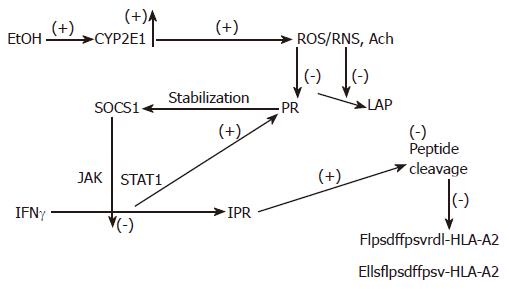Copyright
©2007 Baishideng Publishing Group Co.
World J Gastroenterol. Oct 7, 2007; 13(37): 4931-4937
Published online Oct 7, 2007. doi: 10.3748/wjg.v13.i37.4931
Published online Oct 7, 2007. doi: 10.3748/wjg.v13.i37.4931
Figure 3 The proposed mechanism of regulation of peptide cleavage by ethanol metabolism.
Ethanol (EtOH) treatment induces CYP2E1 activity, which catalyzes production of oxidants. These products block proteasome (Pr) and leucine aminopeptidase (LAP) activities, stabilizing SOCS1 and preventing IFNγ-dependent activation of PA28 and immunoproteasome (IPr). Finally, generation of C-and N-extended peptides for MHC class I-restricted antigen presentation is blocked.
- Citation: Osna NA, Jr TMD. Implication of altered proteasome function in alcoholic liver injury. World J Gastroenterol 2007; 13(37): 4931-4937
- URL: https://www.wjgnet.com/1007-9327/full/v13/i37/4931.htm
- DOI: https://dx.doi.org/10.3748/wjg.v13.i37.4931









